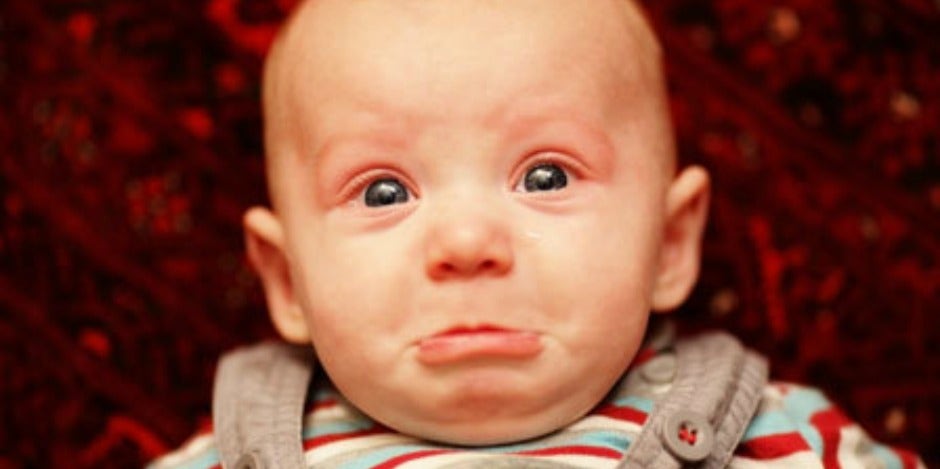The Early Years Of Parenting Kinda Suck (There, I Said It!)
Time becomes strangely warped when you live as a parent.

By Kate Steilen
There are things that older parents say to me that just stick with me. These unexpected conversations happen in the grocery store, when one of my kids is being particularly cute or terrible.
"They grow up so fast." "Before you know it, they'll be this big." "Cherish it." "I miss those days." "What a wonderful age."
Both mothers and fathers make these observations. In the very early days, it used to shock me, that they had so many unsolicited things to say. I didn't even know what this creature was and yet they saw my baby as, somehow, a topic. Their hair, their paci, their gender, their baby fat, their new tooth, their runny nose, and of course, their behavior. (Though this attention really begins with pregnancy, when people look and wink and comment on the thing inside you.) There was no longer a distance between me, the stranger, and them, the total stranger — we were parents.
Now I am accustomed to it, even flattered. There is something encouraging about being recognized by parents, who know what it's like to hold a kid in each arm or drag noncompliant children through large marketplaces. Who seem to remember just how much kids cry, and whine, and say ridiculous things. Of course, there are also those who don't seem to remember.
Time becomes strangely warped when you live as a parent.
Having young children around you almost all the time can feel like stepping on a treadmill moving too fast — you step on at 6:30 a.m. and don't get off until 7 p.m., or 8, or 10. There are days you're not sure if you even sat down except to hold a child. The pace is unpredictable. There are weekends after which you cannot manage to answer that Monday question, "What'd you guys do this weekend?" because your body is still in shock. There are mornings that are so long, so filled with unfortunate events, sometimes I feel I've put in a full day's work before many people are heading to the office.
So when I finally do make it to the grocery store with a toddler — unshowered and overcaffeinated — and a kind face tells me to cherish it, I may just scream. It takes manners to smile, nod, and pat baby's head and push on, because really what I want to say is "NO. I WILL NOT CHERISH how stretched I feel. Do I make this look easy? Because it's hard. Really hard!"
Why do older parents forget the oppression of fatigue and anguish? How can they not remember the stress of wondering whether your kids will ever resemble the child you like seeing in public, the 10-year-old? The kind that can basically mimic an adult. I want to move ahead at light speed, to school and self-reliance and reading, a place with less Angelina Ballerina and more night sleep, but I know there's something these parents are trying to tell me.
These comments, I tell myself, are the future. They are the wide lens of parenting. They are the blessed, because they have forgotten. They even have nostalgia. Perhaps they have moved on to new and more complicated stresses, like eating disorders and not making the varsity team and hating school.
When I think about the future of parenting, I try to keep my own pains in the close-up; let us hope they are temporary. And I try to think like them, when I will remember the messy and incoherent years as rather lovely and definitely special. The risk of ruminating over the daily struggles is that, suddenly, a dozen years pass, and you have an adolescent.
I suppose I like that what "cherish it" mostly says is kids are special. Distinct. Once hand dimples and lisps disappear, they do not come back. Do not rush to fit them into the crowd and your lockstep life. What I hope they are saying is that parenting has pleasures ahead.
What do I know? All I have to do is get some groceries and hope for a lunchtime nap. What did we do this weekend? We lived.

